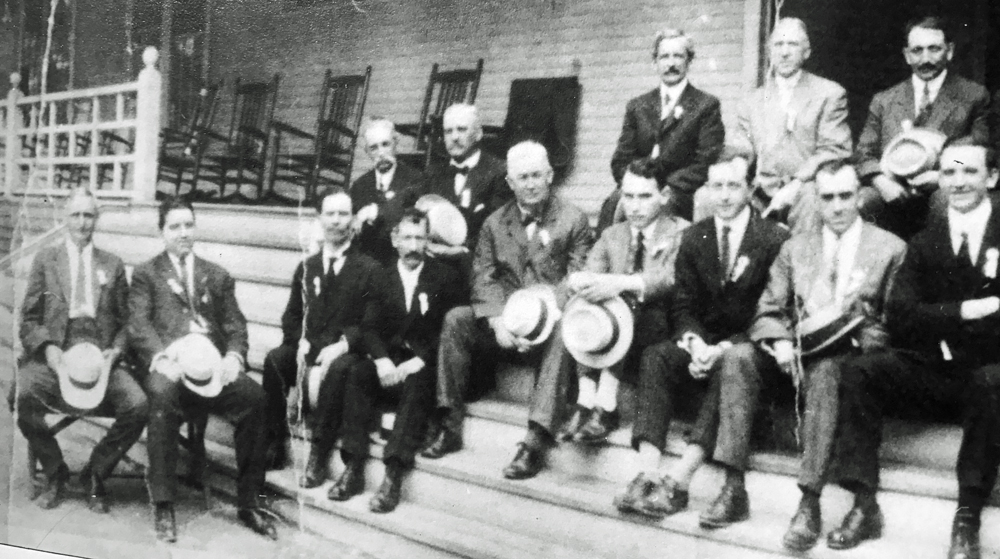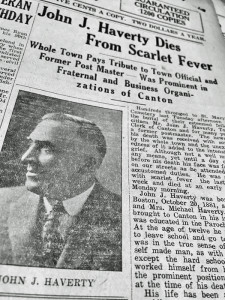True Tales from Canton’s Past: Cooking With Gas
By George T. Comeau
A group of men from the Canton Board of Trade at an outing in 1916 (Courtesy of the Canton Historical Society)
The trustees of the Canton Public Library are in the midst of developing a strategic plan that will help shape services and support for a changing community. Just how much we have stayed the same is apparent by the vision statements that have been developed by the various citizens that are guiding the process. The vision for the community is that “we will be a welcoming social and business community with cultural, historical, and economic vibrancy, willing to move with the times.”
A major theme that has been running through discussions is a growing sense of civic engagement and a welcoming spirit that draws more voices into community decisions. These themes are echoed in a group of men that gathered in 1916 to form the Canton Board of Trade. The voices today are as strong as they were more than two generations ago. And when you turn on your gas cooktop, you have these men to thank.
On a Tuesday night in March 1916, 60 men gathered on the first floor of Memorial Hall. They had a sumptuous turkey dinner with all the sides you could imagine, after which they set into an agenda. Led by the local postmaster by the name of John Haverty, this was a collection of businessmen who had only the growth of the town as their interest. The organizers held in their hand that night a list of 73 men, all of whom pledged their support to furthering the business of Canton.
Haverty was born in Boston in 1881 to Irish immigrant parents who emigrated in 1873. Within a year of his birth, his family moved to Canton, where Haverty’s father was a puddler in the iron works. As a young man, John would work in the iron works, and his sisters worked in the local mills. Eventually the family lived on Bolivar Street. Described as a “self-made man,” Haverty was given a parochial school education and eventually became a real estate and insurance salesman.
That night in March, Haverty had the town’s future in his mind, and he walked with purpose to address the audience. As the seventh in a line of postmasters that extended back to 1866, Haverty was well known and liked by all. With light grey eyes and a shock of brown hair, the 36 year old was affable and possessed a broad knowledge of the town. “We are assembled here for building up an association that will foster, encourage and develop the civic and commercial prosperity of the town,” he started.
It was a who’s who of Canton. In the audience that night was Dr. Foley, Dennis Trayers, James Roach, Antonio Pesaturo, Nahum Mosman, Emil Olsen, Chester Wentworth, and scores of other names. To put it plainly, business interests brought the religions of the town together — Protestants, Catholics, Jews — as well as the nationalities — Irish, French, Italian, Native American, and the well-established New England founding families. The Canton Board of Trade was perhaps the turning point for civic understanding of how everyone would have a stake in the future of Canton’s industry.
Haverty stressed that the group “should strive to make the town a better place in which to live.” The goal was to link the wealth, industries, trade and influence of the town to “see to it that our citizens get all that tends to bring health, happiness and prosperity.” The early 1900s were a tough time for Canton’s industry. By 1916, several major businesses had ceased to exist; in particular the large mills had been quiet as textile and weaving had moved to the south. The Revere Copper & Rolling Mill had closed and lay vacant for some time. It was only in 1909 that the Plymouth Rubber Company had moved onto the site. The same was true with the Kinsley Iron Works and the Morse Black Lead Works. Large companies that had been the mainstay of the manufacturing prowess of the town were in a state of flux.
Canton was, as all of America was, swept up in the Progressive Era. The period between the 1890s to the 1920s saw vast reforms in the way that citizens lived, voted, and were governed. Social activism was at the core, and in fact prohibition was one of the hallmarks of this period. Canton had been undergoing many years of anti-alcohol rallies that often pitted the captains of the “older” industries against the Irish and Italian immigrant working class. But that night in 1916 saw a “kumbaya” moment.
Postmaster Haverty spoke with emotion: “Let us be optimistic in what we do. Pessimists have no place in this association. They are like the sparrows who drive out the song birds and do not sing themselves.” And Canton had quite the song to sing, just as it always would have. In particular, the proximity to Boston, which caused the group to adopt the slogan “Boston 15 miles, 15 minutes, 15 cents.”
The railroad, as it had always done, continued to bless Canton with easy access. No longer would residents have to live, work and play in their own town; they could now work in Boston and be home to read the evening paper and enjoy the quality of life not found in the city. The Board of Trade touted a laundry list of “bests,” including the best water in the state, large tracts of desirable land, and excellent freight facilities. The community boasted beautiful homes, good schools, decent roads, and of course, rural mail delivery. The board recognized and intended to extoll the virtues of the fire department, which was about to become fully motorized. There were three railroad stations, a hospital, several banks, a new trust company, club houses, two street car lines, modern stores, and in their words, “by no means least, the Great Blue Hills for scenery.”
As the evening drew to a close, the men voted a slate of officers with Haverty as president. All of these leaders pledged to do their part towards “booming the town and the society.” And before the ink was dry on their association, the local paper threw down their first challenge. “The Canton Business Association has its work cut out for it in that little job of getting a train to Boston about 7 p.m. that will reach that city before the last act in the Boston playhouses.” As it turned out, the concern of the day was the lateness of trains, which caused Canton riders the inability to attend the “shows” in the theatre district.
By September the association had solved the train issue. The railroad, after due pressure, recast the schedule such that an inbound express train would stop and pick up passengers to avoid delays on the main line. After the trains, the “Board of Trade” as it became known, started to become active in ensuring that utilities were upgraded. They began lobbying the selectmen for installation of gas lines in the town. They scrutinized the franchise agreements and made recommendations. In October the town entered into a contract with the Brockton Gas Light Company to install the first gas lines in town. The fact that we have gas in our homes today can be directly traced to the work these men did, which culminated in a contract on October 10, 1916.
The Board of Trade brought a new voice to Canton, one that was unified and supportive of quality of life issues tied to responsible growth. The issues they faced of traffic, growth, pollution, adequate utilities, and a strong business climate are in fact the same issues we face today.
Haverty died of scarlet fever in 1928, and hundreds of mourners attended his funeral. One observer wrote that Haverty was “an unexpressive man whose life expressed so much.”
We still actively hold out the riches of Canton. With the departure of Reebok, and the need for a unified approach to Route 138, there is still work to be done. But the slogan that was adopted by the Board of Trade in July 1916 has a special ring to it today: “America First, Canton Next.”
Short URL: https://www.thecantoncitizen.com/?p=36071











